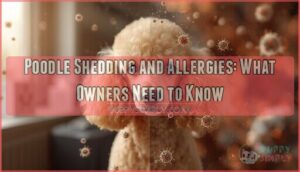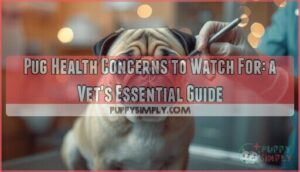This site is supported by our readers. We may earn a commission, at no cost to you, if you purchase through links.
When British breeders set out to resurrect the toy spaniels immortalized in 17th-century royal portraits, they created a dog that would skyrocket from obscurity to the 13th most popular breed in America within three decades.
The Cavalier King Charles Spaniel isn’t just another pretty face with silky ears and soulful eyes—this compact companion packs serious emotional intelligence into a 13-18 pound frame, earning its reputation as the quintessential “velcro dog.”
But beneath that affectionate temperament lies a sobering reality: genetic health issues affect the majority of Cavaliers, with heart disease striking half by age five. Understanding what you’re signing up for means looking beyond the breed’s undeniable charm to grasp the full picture of care requirements, health management, and the commitment needed to give these devoted dogs their best life.
Table Of Contents
Key Takeaways
- Cavalier King Charles Spaniels carry devastating genetic health burdens—50% develop mitral valve disease by age five, and up to 70% experience syringomyelia by age six, making regular cardiac screening and neurological monitoring non-negotiable parts of ownership.
- Despite their small 13-18 pound frames and gentle temperaments that make them excellent family companions, these “velcro dogs” struggle profoundly with separation anxiety and shouldn’t be left alone for more than 4-6 hours.
- The breed’s popularity surge from 56th to 13th place in AKC rankings between 1998 and 2024 reflects their exceptional emotional intelligence and adaptability to apartment living, but prospective owners must understand this charm comes with serious long-term health management responsibilities.
- Proper Cavalier care demands consistent investment beyond basic companionship—expect daily grooming sessions, 40-60 minutes of exercise, meticulous weight monitoring to prevent obesity in a breed where over 40% struggle with weight gain, and financial preparedness for inevitable hereditary conditions that often shorten their 10-12 year lifespan.
Cavalier King Charles Spaniel Origins
The Cavalier King Charles Spaniel carries a royal lineage that stretches back centuries, but its modern recognition tells a different story. Understanding how major kennel clubs officially acknowledge this breed—and where it ranks in popularity today—helps you appreciate why Cavaliers have captured hearts worldwide.
Let’s look at the breed’s formal recognition and its standing among dog lovers.
AKC and International Recognition
The Cavalier King Charles Spaniel earned official AKC recognition in 1995 as the 140th breed, marking a turning point for enthusiasts across the United States. You’ll find this Toy Group member recognized by major kennel clubs worldwide—including the FCI, Canadian Kennel Club, and UK Kennel Club—each maintaining consistent breed standards for height, weight, and the four classic color varieties that define proper pedigree verification.
The breed’s popularity can be attributed to its cavalier king characteristics, which make it a beloved companion.
Breed Popularity and Rankings
Since earning that stamp of approval, registration statistics tell a striking story. By 2024, the breed climbed to 13th place among all AKC breeds—up from 56th in 1998—reflecting surging owner demographics drawn to its gentle temperament.
Global rankings mirror this trend: you’ll see 6th place in the UK, 4th in Australia, and consistent top-20 finishes across Europe, cementing breed trends that favor affectionate toy group companions. The popularity of dog breeds can be further understood through public data sources.
Physical Traits and Breed Characteristics
When you first lay eyes on a Cavalier King Charles Spaniel, you’ll notice the breed’s unmistakable elegance and charm. These dogs possess a unique combination of physical traits that set them apart from other toy breeds, from their silky coats to their expressive eyes.
Let’s examine the key characteristics that define this beloved companion breed.
Size, Coat Types, and Colors
Your Cavalier King Charles Spaniel will stand 12–13 inches tall and weigh between 13 and 18 pounds—perfectly sized for the Toy Group.
You’ll find four official Breed Standards colors: Blenheim (chestnut on white), Tricolor, Ruby (solid red), and Black Tan.
Their silky, medium Coat Length showcases elegant Feathering Patterns on ears, chest, and legs—no undercoat means less bulk, but Color Genetics ensures stunning variety with minimal Size Variation.
Distinctive Features
You’ll immediately notice your Cavalier King Charles Spaniel’s hallmark features. That gently domed skull—nearly flat between the ears—frames large, dark, soulful eyes that create their signature sweet Eye Expression.
Abundant Ear Feathering extends up to 22 centimeters, while the Tail Carriage stays level or below the backline.
The Facial Structure shows a well-filled muzzle, avoiding snipiness, with black pigmented lips defining this beloved Toy Group companion.
Shedding and Allergy Considerations
Your Cavalier King Charles Spaniel sheds moderately year-round—don’t believe the hypoallergenic myths. The breed produces allergens through dander, saliva, and silky hair found consistently on furniture and clothing.
- Shedding Patterns: Expect continuous, moderate fur release rather than seasonal peaks
- Allergen Reduction: Daily brushing and monthly bathing help control dander levels
- Coat Maintenance: Professional grooming every eight weeks prevents matting and allergen accumulation
- Dander Management: Frequent surface cleaning minimizes allergic reactions in sensitive individuals
- Pet Allergy Information: All dog shedding produces proteins that trigger allergies regardless of breed
Temperament and Family Suitability
If you’re wondering whether a Cavalier fits your family and lifestyle, you’re asking the right questions. These dogs have personalities that make them standout companions, but their needs and social tendencies vary depending on your household setup.
Let’s look at how Cavaliers behave, how they interact with kids and other animals, and whether they’ll thrive in your living space.
Personality and Behavior Traits
What makes the Cavalier King Charles Spaniel such a beloved companion? Their temperament combines exceptional emotional intelligence with an almost magnetic need for social bonds—over 80% are true “velcro dogs.”
You’ll find their playful nature balanced by sensitivity to your moods, while their trainability responds best to positive reinforcement.
Watch for separation anxiety, though; these dogs mirror your emotional state and don’t thrive alone.
Interaction With Children and Other Pets
You’ll find these gentle companions excel as family dogs, with 93% showing zero aggression toward children. Supervision matters, though—their fragile build makes child safety tips essential for kids under five.
Household dynamics improve with proper socialization techniques: 88% integrate beautifully with cats, and 87% coexist peacefully with other dogs. Pet introduction methods using gradual exposure and positive reinforcement boost inter species harmony by 70%.
Adaptability to Apartment Living
Your Cavalier King Charles Spaniel won’t complain about apartment sizing—weighing just 13-18 pounds, they’re ideal for compact urban spaces. Their remarkable tolerance to urban noise and minimal barking tendencies (rated 5/5 for quietness) make them standout neighbors.
Indoor exercise through puzzle toys and two daily 15-30 minute walks satisfies their activity needs. Space optimization isn’t challenging when this dog breed information prioritizes companionship over square footage.
Health Issues and Lifespan
If you’re considering bringing a Cavalier into your home, you need to understand the health challenges this breed faces. While these dogs offer amazing companionship, they’re genetically predisposed to several serious conditions that can affect both their quality of life and longevity.
Let’s look at the most common hereditary issues you’ll want to watch for and what you can realistically expect regarding lifespan.
Common Hereditary Health Conditions
This breed’s genetic landscape carries a heavy burden—hereditary conditions aren’t rare exceptions but expected challenges you’ll face. Understanding what’s ahead helps you protect your companion’s quality of life.
- Mitral Valve Disease affects approximately 50% of Cavaliers by age five, progressing to nearly universal prevalence by ten years. Early detection through regular cardiac screening is essential.
- Syringomyelia impacts up to 70% of dogs over six, causing neurological pain and scratching behaviors that many owners initially miss.
- Hip Dysplasia occurs in at least 25% of Cavaliers—twice the officially reported statistics—requiring vigilant monitoring and potential surgical intervention.
- Luxating Patellas and Epilepsy round out the common concerns, while genetic testing helps responsible breeders reduce disease transmission.
Lifespan Expectations
Your Cavalier’s life expectancy hovers between 10 and 12 years—roughly two years shorter than the average dog. Genetic factors like mitral valve disease shorten lifespans considerably, with mortality rates spiking before age ten. Healthspan often lags behind longevity trends; many Cavaliers spend their final years managing chronic conditions. Recent UK studies show responsible breeding practices are gradually improving dog health outcomes and extending the aging process.
Cavaliers live 10–12 years, but genetic heart disease and chronic conditions often shorten their healthspan before their lifespan ends
| Region | Median Lifespan | Key Factor |
|---|---|---|
| UK | 10.45–11.8 years | Health screening |
| US | 10–12 years | Breeding practices |
| Japan | 13.1 years | Veterinary care |
Care, Grooming, and Training Needs
Your Cavalier’s silky coat and gentle temperament require consistent attention to keep them healthy and happy. Beyond regular brushing and bathing, you’ll need to focus on exercise, training, and proper nutrition to prevent common issues like obesity and dental disease.
Here’s what you need to know about maintaining your companion’s well-being through every stage of life.
Coat Maintenance and Grooming Essentials
You’ll need to brush your Cavalier King Charles Spaniel three to four times weekly using slicker brushes and combs—this routine reduces matting risk by 95% and keeps their coat shining beautifully. Daily coat brushing handles those high-friction zones behind ears and under legs, cutting severe matting by over 80%.
Monthly bathing maintains ideal coat care, though over-washing increases skin dryness. Professional grooming every 6–8 weeks ensures proper hair trimming and overall coat health.
Exercise and Mental Stimulation
Your dog’s physical and mental health depend on regular activity—40 to 60 minutes of daily walks keeps your Cavalier King Charles Spaniel cardiovascularly fit and prevents obesity.
Mental games like puzzle toys and scent work provide essential stimulation techniques, engaging your dog’s problem-solving skills for 15–30 minutes daily.
Exercise needs extend beyond physical play; incorporating canine sports like agility or play therapy satisfies both body and mind simultaneously.
Training Methods and Socialization
Beyond physical activity, training routines using positive reinforcement build your Cavalier King Charles Spaniel’s confidence and obedience. Behavioral conditioning through reward-based dog training achieves mastery of basic commands in just two weeks with consistent 10–15 minute daily sessions.
Start socialization techniques between 3 and 14 weeks—exposure to new people and environments during this puppy development window reduces adult fear responses by 70%.
Nutrition and Weight Management
Your Cavalier King Charles Spaniel thrives on precise caloric intake—adults usually need 430–530 calories daily, split between two meals.
Since over 40% of Cavaliers struggle with weight gain, nutrient balance matters tremendously for preventing health issues.
Monitor portion sizes using proper measuring tools, and keep treats under 10% of daily calories. Regular weigh-ins catch problems early, protecting your companion’s cardiac and joint health.
Frequently Asked Questions (FAQs)
What are the best Cavalier King Charles Spaniel breeders?
Let’s be honest—finding a top-tier breeder who actually tests for mitral valve disease and syringomyelia isn’t easy.
You’ll want AKC Breeders of Merit like Cedar Creek or Carlisle Cavaliers, offering health guarantees and transparent ethical practices.
How much does a Cavalier King Charles Spaniel cost?
You’ll generally spend around $2,500 for a Cavalier puppy from reputable breeders, though prices range from $1,500 to $3, Show-quality dogs can reach $6,000, while adoption fees run $100 to $
Can Cavalier King Charles Spaniels be left alone?
While your companion may weather brief absences, these velcro dogs shouldn’t face solitude exceeding 4-6 hours.
Separation anxiety strikes up to 72% of Cavaliers. Implement alone time training and enrichment toys, and consider dog sitters for extended periods.
Do Cavalier King Charles Spaniels bark a lot?
You won’t find yourself dealing with constant noise. These dogs rank among the quieter breeds, barking occasionally rather than persistently.
Most vocalization stems from specific triggers like doorbells or separation anxiety, not inherent breed characteristics.
Conclusion
Your heart may fall head over paws for the Cavalier King Charles Spaniel, but responsible ownership demands clear-eyed commitment. This breed’s genetic vulnerabilities aren’t dealbreakers—they’re realities requiring proactive veterinary partnerships, financial preparation, and consistent preventive care.
When you understand the complete picture—from mitral valve disease monitoring to daily grooming rituals—you’re positioned to provide the outstanding care these devoted companions deserve. Their unconditional love comes with conditions: your dedication to their wellbeing matters profoundly.
- https://en.wikipedia.org/wiki/Cavalier_King_Charles_Spaniel
- https://today.yougov.com/topics/society/explore/breed/Cavalier_King_Charles_Spaniel
- https://www.cavalierhealth.org/overview.htm
- https://pubmed.ncbi.nlm.nih.gov/26401332/
- https://qualzucht-datenbank.eu/fact-sheet-dog-breed-cavalier-king-charles-spaniel/














